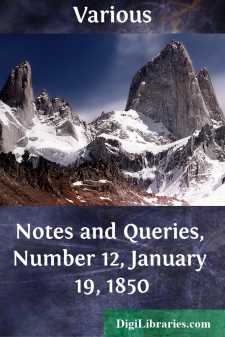Categories
- Antiques & Collectibles 13
- Architecture 36
- Art 48
- Bibles 22
- Biography & Autobiography 813
- Body, Mind & Spirit 142
- Business & Economics 28
- Children's Books 14
- Children's Fiction 11
- Computers 4
- Cooking 94
- Crafts & Hobbies 4
- Drama 346
- Education 46
- Family & Relationships 57
- Fiction 11829
- Games 19
- Gardening 17
- Health & Fitness 34
- History 1377
- House & Home 1
- Humor 147
- Juvenile Fiction 1873
- Juvenile Nonfiction 202
- Language Arts & Disciplines 88
- Law 16
- Literary Collections 686
- Literary Criticism 179
- Mathematics 13
- Medical 41
- Music 40
- Nature 179
- Non-Classifiable 1768
- Performing Arts 7
- Periodicals 1453
- Philosophy 64
- Photography 2
- Poetry 896
- Political Science 203
- Psychology 42
- Reference 154
- Religion 513
- Science 126
- Self-Help 84
- Social Science 81
- Sports & Recreation 34
- Study Aids 3
- Technology & Engineering 59
- Transportation 23
- Travel 463
- True Crime 29
Notes and Queries, Number 12, January 19, 1850
by: Various
Categories:
Description:
Excerpt
ORIGIN OF A WELL-KNOWN PASSAGE IN HUDIBRAS.
The often-quoted lines—
"For he that fights and runs away
May live to fight another day,"
generally supposed to form a part of Hudibras, are to be found (as Mr. Cunningham points out, at p. 602. of his Handbook for London), in the Musarum Deliciæ, 12mo. 1656; a clever collection of "witty trifles," by Sir John Mennis and Dr. James Smith.
The passage, as it really stands in Hudibras (book iii. canto iii. verse 243.), is as follows:—
"For those that fly may fight again,
Which he can never do that's slain."
But there is a much earlier authority for these lines than the Musarum Deliciæ; a fact which I learn from a volume now open before me, the great rarity of which will excuse my transcribing the title-page in full:—
"Apophthegmes, that is to saie, prompte, quicke, wittie, and sentencious saiynges, of certain Emperours, Kynges, Capitaines, Philosophiers, and Oratours, as well Grekes as Romaines, bothe veraye pleasaunt and profitable to reade, partely for all maner of persones, and especially Gentlemen. First gathered and compiled in Latine by the right famous clerke, Maister Erasmus, of Roteradame. And now translated into Englyshe by Nicolas Udall.Excusam typis Ricardi Grafton, 1542. 8vo."A second edition was printed by John Kingston, in 1564, with no other variation, I believe, than in the orthography. Haslewood, in a note on the fly-leaf of my copy, says:—
"Notwithstanding the fame of Erasmus, and the reputation of his translator, this volume has not obtained that notice which, either from its date or value, might be justly expected. Were its claim only founded on the colloquial notes of Udall, it is entitled to consideration, as therein may be traced several of the familiar phrases and common-place idioms, which have occasioned many conjectural speculations among the annotators upon our early drama."The work consists of only two books of the original, comprising the apophthegms of Socrates, Aristippus, Diogenes, Philippus, Alexander, Antigonus, Augustus Cæsar, Julius Cæsar, Pompey, Phocion, Cicero, and Demosthenes.
On folio 239. occurs the following apophthegm, which is the one relating to the subject before us:—
"That same man, that renneth awaie,
May again fight, on other daie.
"¶ Judgeyng that it is more for the benefite of one's countree to renne awaie in battaile, then to lese his life. For a ded man can fight no more; but who hath saved hymself alive, by rennyng awaie, may, in many battailles mo, doe good service to his countree."§ At lest wise, if it be a poinet of good service, to renne awaie at all times, when the countree hath most neede of his helpe to sticke to it."Thus we are enabled to throw back more than a century these famous Hudibrastic lines, which have occasioned so many inquiries for their origin.
I take this opportunity of noticing a mistake which has frequently been made concerning the French translation of Butler's Hudibras. Tytler, in his Essay on Translation; Nichols, in his Biographical Anecdotes of Hogarth; and Ray, in his History of the Rebellion, attributes it to Colonel Francis Towneley; whereas it was the work of John Towneley, uncle to the celebrated Charles Towneley, the collector of the Marbles.
EDWARD F....












